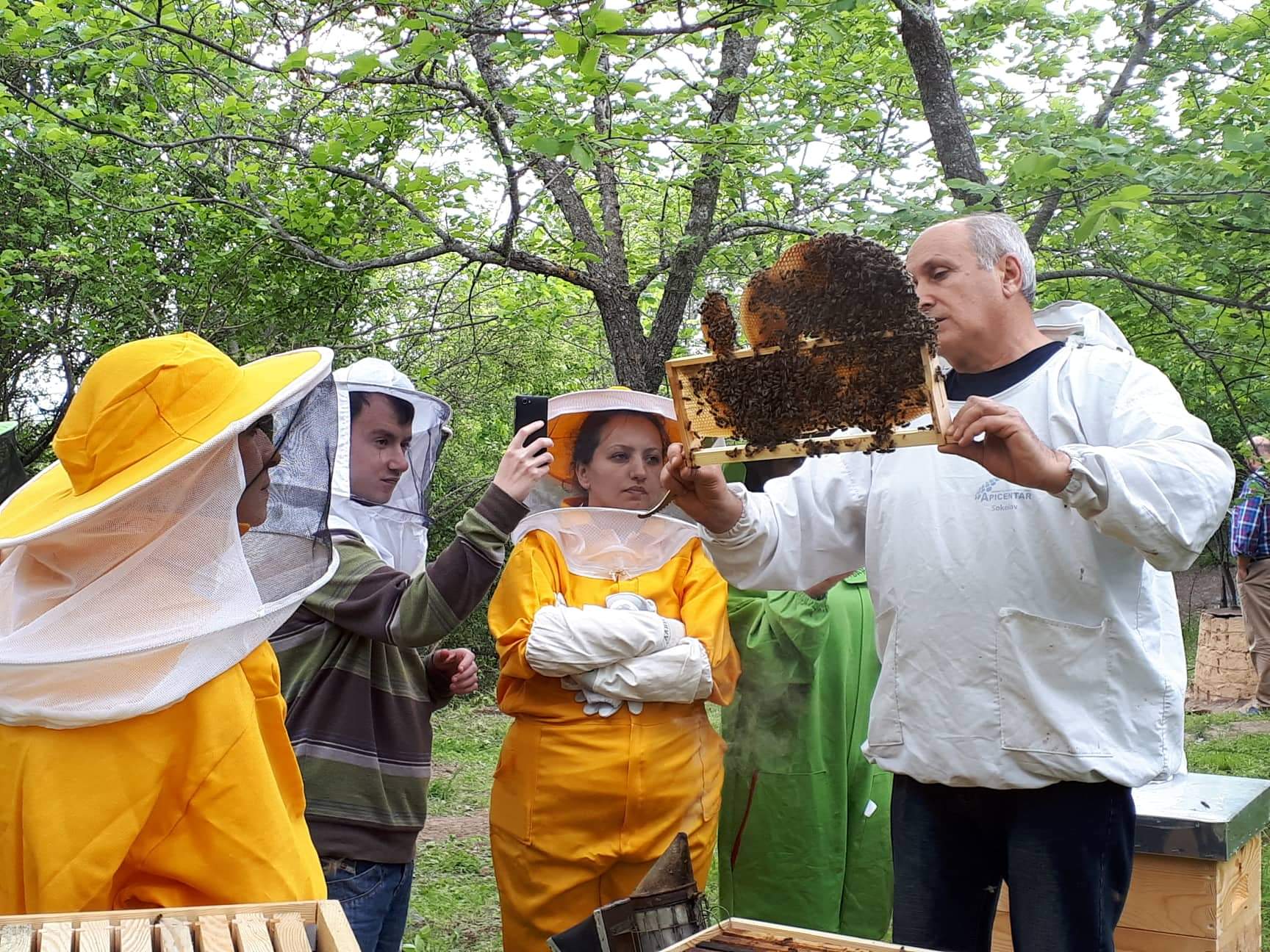
The municipality of Kavadarci is in the Tikveš region of North Macedonia. With fewer than 40,000 inhabitants, like many other rural regions in the Western Balkans the municipality suffers from young people and families migrating to bigger cities in search of a better life. Such migration was the main motivation for launching the EU-funded Vitac incubator project promoting organic beekeeping, as a lack of economic opportunity is known to be the main reason for migration to bigger cities. Zlatka Milkov is one of those who has so far stayed in Kavadarci. She has a degree in agriculture, but worked as an accountant for some years. Meanwhile, Zlatka’s husband, who works as an electrician, keeps bees. “But I was never really interested in beekeeping; I only helped my husband packaging the honey once we had the final product,” says Zlatka.
However, in 2020, her husband heard about a programme offering training on organic honey production, provided by the Vitac project, designed and implemented through the EU-funded Regional Programme on Local Democracy in the Western Balkans (ReLOaD). Zlatka had more spare time than her husband, as she was not working at that time, so he asked her if she would like to join. Reluctantly, she agreed.
“I learned many things, from the biology of bees to interesting details of honey production. Every moment was fun and interesting,”
Zlatka Milkov, organic honey producer
The training lasted for nine months and included theoretical and practical knowledge on organic beekeeping. “I learned many things, from the biology of bees to interesting details of honey production. Every moment was fun and interesting,” says Zlatka.
Over the course of a year, the project supported 15 participants, including women and young people from the region. During the practical training, participants created 30 organic bee colonies which were then given to them so they could start or expand their beekeeping businesses with an organic approach. Those taking part were also certified for organic bee-rearing. Participants learned how organic food, including organic honey, is grown without the use of human-made pesticides and fertilisers, and does not contain genetically modified organisms (GMOs). Because of the widespread belief that organic food is safer, more nutritious, and better tasting, they were thus given access to a developing high-value market for organic food around the world.

“The support from the EU was crucial, as the municipalities in the region have funds only for very small-scale projects. With EU support, we were able to implement a much larger project and address local community needs with long-lasting impact.”
Biljana Georgievska, Project Manager
Biljana Georgievska, the project manager, explains that the project required a lot of effort to be implemented properly, but also depended on commitment from participants. “The support from the EU was crucial, as the municipalities in the region have funds only for very small-scale projects. With EU support we were able to implement a much larger project and address local community needs with long-lasting impact,” she says.
Zlatka has now become the leader of the family’s bee-rearing business which is now almost 100% organic. Meanwhile, the family won first prize for the quality of their honey in an annual national competition in Tetovo. “I am thinking of opening a shop for organic food in the near future. If we can make this work out then perhaps I could be working here on this full time in the future,” says Zlatka.
About the project
The main goal of the Vitac incubator for organic beekeeping project is to prevent emigration and contribute to the revival of rural settlements in the municipality of Kavadarci. Project activities have included theoretical and practical training for the target group in producing organic bee products and bee colonies.
In addition, through the information centre that was established, farmers from the municipality of Kavadarci nowreceive free advice and guidance on how to convert their agricultural production to organic. The project was implemented by the Biovita Association of Organic Producers, financed as part of the EU-funded ReLOaD-Programme and co-financed by the Municipality of Kavadarci.
Photo credits: Vitac
However, in 2020, her husband heard about a programme offering training on organic honey production, provided by the Vitac project, designed and implemented through the EU-funded Regional Programme on Local Democracy in the Western Balkans (ReLOaD). Zlatka had more spare time than her husband, as she was not working at that time, so he asked her if she would like to join. Reluctantly, she agreed.
The training lasted for nine months and included theoretical and practical knowledge on organic beekeeping. “I learned many things, from the biology of bees to interesting details of honey production. Every moment was fun and interesting,” says Zlatka.
Over the course of a year, the project supported 15 participants, including women and young people from the region. During the practical training, participants created 30 organic bee colonies which were then given to them so they could start or expand their beekeeping businesses with an organic approach. Those taking part were also certified for organic bee-rearing. Participants learned how organic food, including organic honey, is grown without the use of human-made pesticides and fertilisers, and does not contain genetically modified organisms (GMOs). Because of the widespread belief that organic food is safer, more nutritious, and better tasting, they were thus given access to a developing high-value market for organic food around the world.

Biljana Georgievska, the project manager, explains that the project required a lot of effort to be implemented properly, but also depended on commitment from participants. “The support from the EU was crucial, as the municipalities in the region have funds only for very small-scale projects. With EU support we were able to implement a much larger project and address local community needs with long-lasting impact,” she says.
Zlatka has now become the leader of the family’s bee-rearing business which is now almost 100% organic. Meanwhile, the family won first prize for the quality of their honey in an annual national competition in Tetovo. “I am thinking of opening a shop for organic food in the near future. If we can make this work out then perhaps I could be working here on this full time in the future,” says Zlatka.
About the project
The main goal of the Vitac incubator for organic beekeeping project is to prevent emigration and contribute to the revival of rural settlements in the municipality of Kavadarci. Project activities have included theoretical and practical training for the target group in producing organic bee products and bee colonies.
In addition, through the information centre that was established, farmers from the municipality of Kavadarci nowreceive free advice and guidance on how to convert their agricultural production to organic. The project was implemented by the Biovita Association of Organic Producers, financed as part of the EU-funded ReLOaD-Programme and co-financed by the Municipality of Kavadarci.
Photo credits: Vitac
Please wait while your video is being uploaded...
Don't close this window!